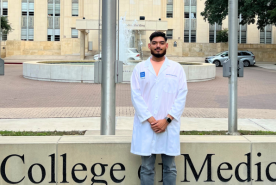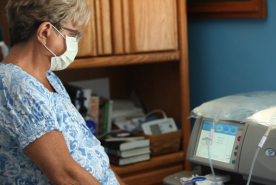What happens when your kidneys fail?
Healthy kidneys do many important jobs. They keep your whole body in balance. They remove waste products and extra water from your body, help make red blood cells, and help control blood pressure. When you have kidney failure, it means your kidneys are damaged. They cannot do these important jobs well enough. Having kidney failure means that:
- 85-90% of your kidney function is gone
- Your kidneys don't work well enough to keep you alive
When is treatment needed?
Your doctor will help you decide when you need to start treatment. The decision is based on:
- Your symptoms
- Other health problems you have
- How much kidney function you have left
- Your nutritional health
When it comes time to choose a treatment for kidney failure, the decision may often be stressful. Learning as much as you can about your options and talking with your healthcare team to choose a treatment plan that's right for you will help you and your family feel better prepared to make this difficult decision. Each option has different advantages and disadvantages so it is important to learn as much as possible. What might be positive for one person might be a negative for someone else.
How do I know which treatment is right for me?
There are two treatment options for kidney failure: dialysis (hemodialysis or peritoneal dialysis) and kidney transplantation.
Talk with your family so you can decide which treatment will best fit your lifestyle needs. Also you always have the choice to change to a different type of treatment in the future. As your needs and your life change over time, so may your treatment. However, there may be medical reasons why a particular treatment option is not right for you, so talk with your health care team to discuss your personal needs.
What is hemodialysis?
Hemodialysis is a treatment that removes wastes and extra fluid from your blood. It can be done at home or at a dialysis center. During hemodialysis, the blood is pumped through soft tubes to a dialysis machine where it goes through a special filter called a dialyzer (also called an artificial kidney). After your blood is filtered, it is returned to your bloodstream. For more information on hemodialysis, click here.
What is peritoneal dialysis?
In peritoneal dialysis (PD), your blood is cleaned inside your body, not outside your body. The lining of your abdomen (the peritoneum) acts as a natural filter. A cleansing solution flows into your abdomen (your belly) through a soft tube called a PD catheter. Wastes and extra fluid pass from your blood into the cleansing solution. Peritoneal dialysis is a home-based treatment and can be done at home, at work, at school or even during travel. Because of this, peritoneal dialysis may allow for greater flexibility. (For more information on peritoneal dialysis, click here.
What is a kidney transplant?
A kidney transplant is an operation that places a healthy kidney from another person into your body. The kidney may come from someone who has died or from a living donor who may be a close relative, spouse or friend. It can even come from someone who wishes to donate a kidney to anyone in need of a transplant. However, a kidney transplant is a treatment, not a cure, and it is important to care for the new kidney with the same care as before receiving the transplant. For more information on kidney transplants, click here.
For the full PDF brochure, Choosing a Treatment for Kidney Failure click here.


















